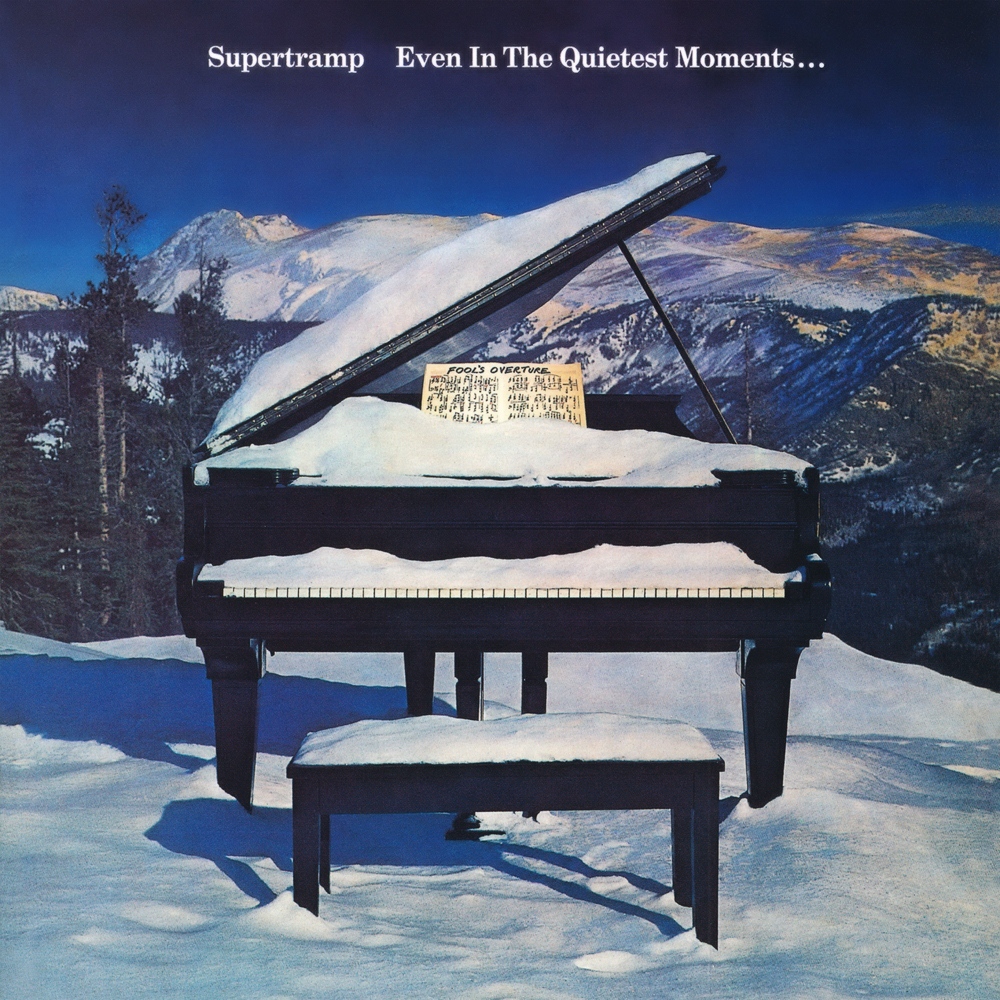Even in the Quietest Moments is the second of two albums wedged between Supertramp’s best album, 1974’s Crime of the Century, and their most commercially successful, 1979’s Breakfast in America. Prior to starting work on Even in the Quietest Moments, Supertramp had made the prescient decision to move their base of operations to America, where their potential audience was still sizeable, as opposed to the UK, where the tide of fashion had turned against them and the tidal wave of Punk was looming large. With this backdrop, there was a lot riding on Even in the Quietest Moments being a success, especially when you consider that the preceding album, Crisis, What Crisis, had not been the commercial success that Crime of the Century had been. Supertramp were therefore in desperate need of a commercial radio hit to halt the sales decline, and so it is no surprise that Even in the Quietest Moments starts with the unmistakable guitar strum that opens “Give a Little Bit”, one of Supertramp’s most accessible pop numbers. “Give a Little Bit” is a shamelessly breezy slice of commercial AOR, and one that still stands up today as a piece of pop music with a killer chorus.
Listening to Even in the Quietest Moments as a whole, “Give a Little Bit” is something a red herring. Anyone looking for an album full of similarly deft pop songs may be a bit disappointed, as the album was pretty much the last stand of Supertamp as approachable prog rockers. After this it was all soft rock pop tunes and the mega-selling Breakfast in America, before the inevitable, but actually pretty good double live album, Paris, and then on to a steep decline in their commercial fortunes. As a result, it’s tempting to overlook Even in the Quietest Moments as a transitional album, when actually it was the end of phase two of Supertramp’s career, and as such, one of their pivotal releases.
Like all the best Supertramp albums, the key to Even in the Quietest Moments is the balance between Roger Hodgson’s wide-eyed falsetto-voiced hippy musings, and Rick Davies’ more grounded, bluesier material. Without this balance, Supertramp become a whole lot less interesting, as evidenced on their post-Hodgson albums. Even in the Quietest Moments maintains that delicate balance while gently increasing the level of sophistication in terms of the arrangements and production – best evidenced at the point where the choir joins in during “From Now On” and the subtly effective title track.
It’s arguable that Even in the Quietest Moments is the best sounding Supertramp album, moving on from the frugal, but effective sound they had employed on their previous couple of albums, and certainly warmer than the clinical pop perfection of Breakfast in America. Its sophisticated sound still can’t save a song like “The Lover Boy” though, the nadir of the album, despite the apparent effort that was put in to create it and while we’re on negatives, I’ve never really had much love for “Babaji” either. Both of these songs are comprehensively overshadowed by the rest of the album.
Even in the Quietest Moments climaxes with the half bonkers, but wholly ambitious, “Fools Overture”, which continues Supertramp’s often overlooked use of sampling, this time having Winston Churchill’s iconic speeches weave their way through the lengthy introduction which continues to swell in power, before Hodgson’s crystal clear voice delivers one of the band’s finest examples of their idiosyncratic blend of heartstring plucking prog. While you can level accusations of ridiculousness at “Fools Overture”, which even the staunchest Supertramp fan would find it difficult to deny, you have to admit, it is probably the most fitting way to bring down the curtain on their prog rock era.
Even in the Quietest Moments is an album that found Supertramp at something of a cross roads, and in that context is a fascinating listen. If they had delivered another Crisis, What Crisis, chances are their career would have faltered. If they hadn’t shifted their focus to the American market in the way that they did, they would have been swept aside by Punk. Even in the Quietest Moments was probably the best album Supertramp could have recorded at the time, it halted their commercial decline and it set them up for bigger success in the American market. On top of all this, it’s generally just a nice album to listen to. What more could you ask for?














No Comment